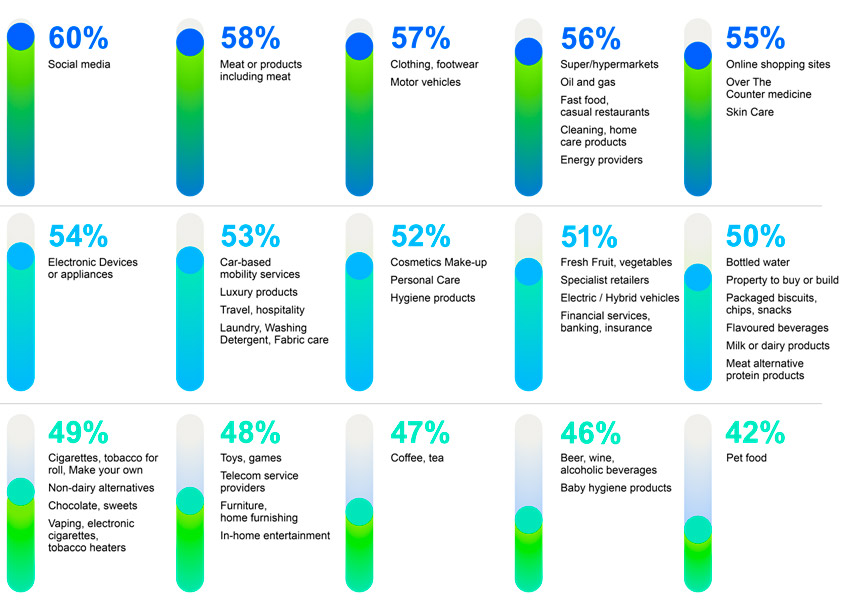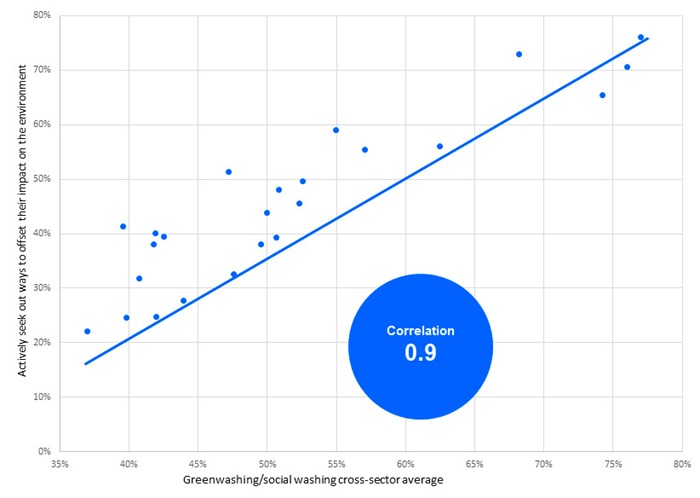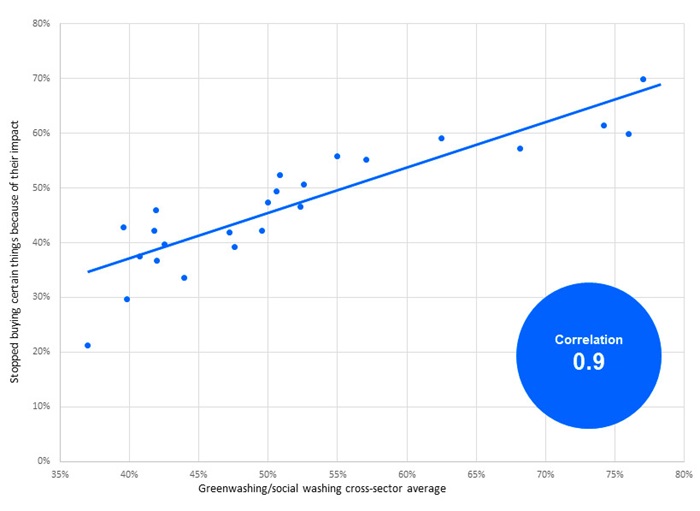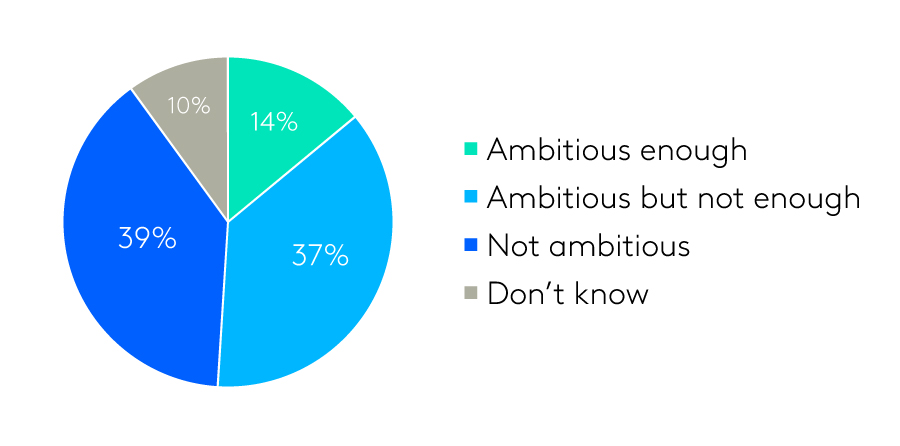Kantar’s Sustainability Sector Index 2023 provides insights from 32,000 interviews across 42 sectors in 33 countries to help brands understand what sustainability means in their sector, how consumers perceive brands, and how to build trust and leadership in this crucial area.
One of the most alarming findings of the study is the universally high levels of consumer concern about greenwashing and social washing. More than half of consumers around the world believe that brands across all industries are misleading with their sustainability claims. So, why are greenwashing fears so widespread, and what is the way forward for brands?
A “crisis of trust” over greenwashing / social washing
Greenwashing is high up the agenda at the moment. The European Commission recently announced it would be updating the EU's pre-existing list of banned commercial practices to include greenwashing, the topic was high on the agenda at NY Climate Week in September, as well as in our recent Sustainable Marketing 2030 work in partnership with the WFA. So, it was not unexpected that consumers have concerns in this area, but we were amazed to see such consistently high levels of perceived greenwashing and/or social washing across all sectors. On average, across sectors, 52% of people globally say they have seen, or heard, false or misleading information about sustainable actions taken by brands.
Concerns about greenwashing or social washing are pervasive across all sectors.

Social media is the industry most likely to be seen to be engaging in greenwashing. These perceptions are most likely driven by the volume of fake news that transits through social media platforms, the noise driven by lawsuits around privacy issues and concerns around algorithms that act to reinforce people’s beliefs even when they are untrue, not to mention recent examples of platforms being manipulated to influence democratic votes in the US and UK. And many other issues have served to increase people’s scepticism as to whether what we see and read on these platforms is trustworthy.
‘Meat’, ‘fashion’ and ‘motor vehicles’ follow social media in the list of sectors most likely to greenwash, followed by a clutch of sectors – all causing discomfort through over-claim or misleading communication.
In contrast, companies selling pet food and baby hygiene products have the lowest associations with greenwashing among consumers. Though it’s worth noting that at 42%, there’s still a high proportion of consumers who believe these sectors are greenwashing, so no sector is truly immune to this scepticism.
Why are brands so implicated?
Our data shows that it isn’t just one thing driving this high level of perception of greenwashing and social washing but a multitude of issues.
For a person who buys a brand, that brand gives them a promise of needs consistently met. Arguably, it has been the case since the first trademarks were registered that brands offer predictable, repeatable quality. But those needs have evolved continuously; functional needs have expanded to cover emotional, social and identity needs. Brands are signifiers of tribal affiliations and, increasingly, of values. But in the face of existing challenges, this positive view of brands seems to be eroding. An incredible 67% of global consumers say they worry brands are involved in social issues just for commercial reasons.A sense that brands put greed and profit above all else has grown over recent years, which explains a base level of cynicism across all sectors. This finding goes hand in hand with a recent study by Kantar’s Worldpanel division that revealed 42% of people globally think brands have taken advantage of inflation to raise their prices unnecessarily.
On top of this, voluntary or involuntarily, miscommunication often happens in consumers’ eyes, such as over-claims or use of vague or technical terms. Consumers often question the veracity of claims that they see and whether these will move the dial – yes this bottle is recyclable but is it actually going to be recycled? Only 36% think brands are proposing meaningful solutions to the environmental and social issues we face.
The absence of communication isn’t any better. 57% Feel that it is really hard to tell which products are good or bad ethically, or for the environment, causing real frustration. If people don’t clearly understand how they contribute to positive environmental and social change when they buy brands, the claims don’t have much meaning to them.
If messages feel empty, it can also be because of misguided strategy – not being credible on certain topics or not addressing them at the right level. Additionally, a lack of clear connection between sustainability initiatives and the brand/product can also lead to a feeling of inauthenticity. As an example, when brands change their logos to rainbow colours during the Pride celebration, for brands who don’t do anything to support this community the rest of the year, it does not feel genuine to people. In the absence of long-term commitment, brands are seen to be jumping on the bandwagon.
A crisis of trust, not without impact…
This crisis of greenwashing and social washing poses a significant barrier to brands enabling change when it comes to sustainable habits, lifestyles and behaviours among consumers. How can brands ask people to make better choices or to take a leap of faith and try something new if they can’t trust the claims that are being presented to them?
The more people look for solutions, the more they feel brands greenwash/social wash and the more they start dropping things out of their consideration set.


Our analysis shows that the more people look for solutions, the more likely they are to believe brands are green or social washing. And the more people suspect brands are greenwashing, the more they start dropping products out of their consideration set. This is a troubling finding for brands; as people become more knowledgeable, the more they sense greenwashing, which leads to mistrust and rejection.
Not only that, but we also found that the more people feel personally impacted by environmental issues, the more they sense greenwashing from brands. As people become more knowledgeable, they feel that the narrative they are being presented with is not compelling enough. And of course, science tells us that all of us are going to experience extreme climate events more and more often, as we have started to see just this summer across the world. So, the erosion of trust is only going to get worse if businesses don’t get ahead of it.
Proactively addressing the issue is key
So, what might ‘getting ahead of it’ look like? How can brands take steps to proactively address green- and social washing?
Kantar’s globally verified model of Inspiring Trust essentially says that three principles define what trust means today: integrity, identification and inclusion.
Integrity is about having clear commitments and doing what you say you’re going to do. Research conducted in 2022 for COP27 revealed that only 14% of global consumers see business plans as ambitious enough when it comes to sustainability. It is therefore imperative for brands to focus on making more “aggressive commitments” to begin with and then follow up on them. Integrity is still the foundation of trust, but the challenge of course is that in a post-truth world, people find it almost impossible to assess integrity, so it’s not enough on its own.

'Do you think current businesses' plans to tackle climate change are ambitious enough?'. Source: Kantar's Planet Pulse 2022.
Identification is one of the most powerful sources of trust in times of disruption and uncertainty. Behavioural science tells us that as human beings, we’re hardwired to identify with and trust those people who share our values and goals. Only 40% of consumers think that brands care about environmental and social issues. So greater alignment and connection between sustainability initiatives and brands is key to better engagement.
Inclusion – we know that unfamiliarity is a barrier to a closer brand-consumer connection, so we need to create closeness in two ways:
- make everyone feel that they belong, with no one feeling they’re being left behind; That means brands need to put in place strong approach to DEI but also consider their pricing strategy for sustainable offers. 68% believe that products that are better for the environment and society are more expensive - this positions sustainability as a luxury which meets the needs of the few.
- get people invested in your actions. Realising the sustainability opportunity is not about showcasing some good actions for people to passively contemplate. Successful brands will make people feel empowered to make truly better choices. And for 61% of people, robust third-party certification will really help to guide their decision-making.
Addressing greenwashing and social washing is key in nurturing brand trust and a critical platform to encourage people to change their behaviours and close the infamous Value-Action Gap.
Download our free booklet and check our Sustainability Sector Index video here:

